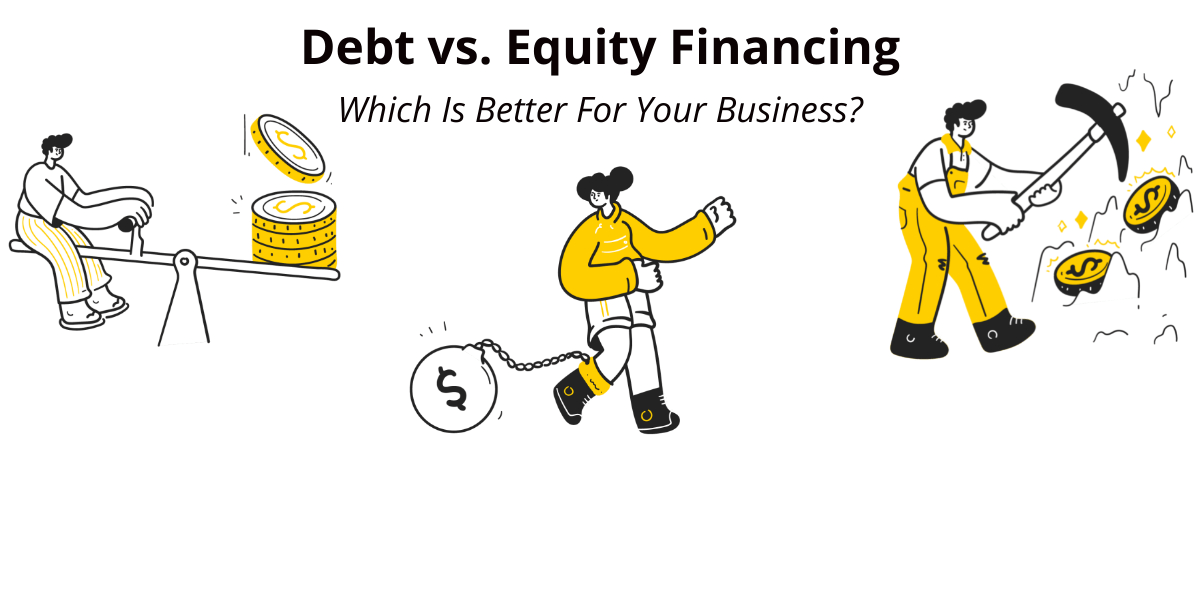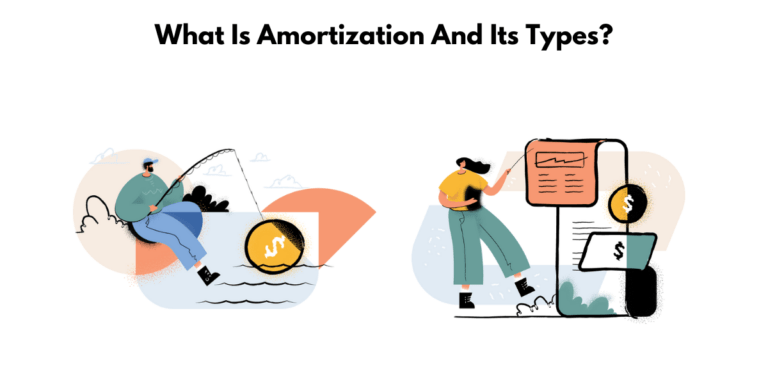A Guide to Debt vs Equity Financing: Which is the better choice for your business?
A Guide to Debt vs. Equity Financing
Debt vs. equity financing. Which is the better choice for your business?
There is no easy answer to this question. The answer depends on several factors, including your business’s stage, industry, and personal preferences.
However, this guide will explore the pros and cons of debt and equity financing so that you can make an informed decision about which option is best for your business.

What is debt financing?
Debt financing is a type of funding that involves borrowing money from lenders. The borrowed funds can be used for various purposes, such as expanding your small business or covering operational costs. Debt financing typically comes with fixed interest rates and repayment terms, which can make it a predictable and affordable option for businesses.
What is the purpose of debt financing?
The purpose of debt financing is to borrow money from a lender to fund business operations. Debt financing is attractive to companies because it allows them to access money without giving up business control. Additionally, interest payments on the loan are tax-deductible.
What are the stages of debt financing?
- Assess your financial health: Before applying for debt financing, assess your financial situation and creditworthiness. Check your credit score, review your cash flow statement, and assess your debt-to-equity ratio.
- Research your options: There are several types of debt financing available. Research each option and determine which one best meets the needs of your business.
- Prepare your application: Once you have chosen the best debt financing option for your business, prepare your application. Gather the necessary documents, such as financial statements, business plans, and credit reports.
- Submit your application: Contact your chosen lender and submit your application. Make sure to include all the necessary documents and answer all questions thoroughly.
- Negotiate the terms: Once your application is approved, the lender will present you with the loan terms. Negotiate the terms if necessary and ensure you understand all the fine print.
- Sign the agreement: Once you have agreed to the terms, sign the loan agreement. This will bind you to the loan’s terms and make you legally responsible for repaying it.
- Repay the loan: Pay your loan on time and in full to avoid late fees and penalties. Paying off your loan promptly will help you improve your credit score and maintain a good relationship with your lender.

What is equity financing?
Equity financing is when a small business raises money by selling shares of ownership in the company. This can be done through an initial public offering (IPO) or selling shares to private investors.
What is the purpose of equity financing?
The purpose of equity financing is to raise funds to meet the liquidity needs of an organization by selling a company’s stock in exchange for cash. The people who buy shares are called company shareholders because they have received an ownership equity interest in the company.
What are the stages of equity financing?
- Prepare a viable business plan: This plan should include your business idea, market analysis, financial projections, and management team.
- Research and identify potential investors: Depending on the type of equity financing, you may be able to approach angel investors, venture capitalists, or equity crowdfunding platforms.
- Pitch your idea: Make sure you can effectively explain your business idea and showcase the potential returns on investment.
- Negotiate the terms of the deal: This involves discussing the type of equity, the amount of money to be invested, and how much control the investors will have in the business.
- Finalize the deal: You will need to sign a contract or other legal document that outlines the terms of the deal and legally binds the parties.
- Manage the relationship: Once the deal is finalized, you will need to manage the relationship with your investor actively. This includes providing regular updates on progress and financial performance.
The advantages of debt financing over equity financing
Debt financing has many advantages over equity financing. For one, debt is a cheaper form of venture capital. Interest rates on debt are often lower than the rate of return that investors expect from equity investments.
Another advantage of debt financing is that it allows companies to keep control of their business. With equity financing, investors often want a say in how the company is run.
Finally, debt payments are tax deductible, while interest payments on equity are not. This can save businesses a significant amount of money.
So, if you’re considering raising venture capital for your business, debt financing should be at the top of your list.
Lower startup costs
Debt financing is an attractive option for startup businesses because it helps reduce costs associated with launching a business. Debt financing often offers lower interest rates than other forms of financing, making it a more cost-effective option for considering access to funds.
When deciding to use debt or equity financing, access to funds is important. With debt financing, the business must make regular loan payments, which can burden cash flow and limit the company’s ability to invest in growth.
Convenience of payment
When deciding whether to use funding vs financing for their business, one factor that can affect a customer’s decision is the convenience of payment. With debt financing, customers can secure a fixed interest rate on their outstanding line balances during burden, allowing them to make the same monthly payment.
Stability of income
Debt financing may be more attractive to businesses with a stable income stream because it allows them to borrow funds and repay them over time in instalments, with the loan’s interest rate typically fixed. This provides a degree of certainty in terms of the repayments, meaning businesses can better plan for the long term.

Higher returns on investment
Debt financing can be a great way to increase returns on investment in a business. A business owner can use additional funds to expand the business and its operations by taking out a loan. This can lead to increased profits and greater returns on investment as the business can generate more revenue from its new projects.
More control over the business
Debt financing gives a business owner more control over their business than equity financing, as the business has loans according to predetermined terms and does not involve giving up any company ownership. With debt financing, the business owner is not required to give up any business control to external investors and can thus retain full decision-making power.
Reduced risk of bankruptcy
Debt financing reduces the risk of bankruptcy by allowing businesses to raise money without surrendering any part of the company. By taking on debt business control, the company does not have to share in the profits, reducing the pressure to turn a profit while maintaining their balance sheets and avoiding additional debt.
Ability to leverage assets
Debt financing is a form of financing that allows businesses to leverage their assets to acquire additional funds. This financing involves borrowing money from a lender in exchange for a promise to repay the loan plus interest. Debt financing allows a business to acquire capital without using cash or liquidating other existing assets equity.
Increased liquidity
Increased liquidity can be extremely beneficial for debt financing, making the securities more attractive to potential investors. With increased liquidity, investors have more confidence in the loan’s value, as they know they will be able to quickly sell the loan and receive back the money they originally invested.
Improved financial health
Debt financing allows businesses to gain access to capital quickly and effectively and improve, making moving their financial health. When businesses take on debt financing, they are typically able to secure a fixed loan’s value relationship discount, which sells the loan quickly. To sell the loan quickly.

The advantages of equity financing over debt financing
There are many advantages of equity financing over debt financing. For one, equity financing does not require repayment, unlike debt financing, which must be repaid with interest. This can free up cash flow for other purposes, such as investments or expansion.
Equity also offers potential tax benefits and allows the business to retain full company ownership.
Finally, equity investors may offer valuable advice and networking connections that can help the business grow.
Ownership of company assets
Equity financing helps the entrepreneur maintain ownership of the company assets by providing capital without incurring debt or other liabilities. By investing the seed capital of $1,000,000 in the company, the entrepreneur can retain ownership of the company’s assets while also avoiding the company obtaining loans or issuing other instruments of indebtedness.
Ability to influence company decisions
Equity financing can help influence company decisions as it allows for an infusion of funds and access to a wider network of potential customers. This can be especially beneficial when the company manages its business and how aggressively it wants to grow.
Potential for greater returns on investment
Equity financing can offer investors the potential for higher returns on investments, as investors benefit from owning a part of the business and any associated growth in its value. By providing funds to help expand the business, investors can benefit from increased sales, profits, and market share.
Less restrictive loan terms
The terms of equity financing are typically more flexible than those of debt financing, making it an attractive option for many businesses. Equity financing is typically less restrictive than debt financing because the lender does not require repayment of the loan, allowing the business to use the funds as needed.
With equity financing, the business is not responsible for making regular payments, which can be a major benefit for businesses with limited cash flow. Additionally, the lender will not require interest payments, making it a cost-effective option.
Potential to avoid paying interest payments
Equity financing helps business owners avoid paying interest payments by allowing them to exchange ownership of their business for the capital they need. Unlike debt financing, there is no loan to repay with equity funding. Instead, investors provide essential expertise, the management or technical skills, contacts or networks, and reputation to the company, in addition to capital.
Ability to access capital more quickly
Equity financing can help to access capital more quickly because it offers companies an alternative funding source to debt, and investors typically focus on the long term without expecting an immediate return on their investment.
Increased liquidity in case of emergency
Equity financing can provide increased liquidity in an emergency, allowing businesses to raise funds without taking on additional debt and maintain a stable balance sheet.
This increased liquidity can benefit businesses by providing them with the resources and capital needed to grow, expand into new markets, or diversify their products without having to worry about the burden of debt repayments.
Potential to reduce tax liabilities
Equity financing can be a great way to lower a company’s worries worrying and help it grow. Through limited partnerships, investors are exempt from participating in management duties, and profits and losses can be more easily transferred between partners.
Opportunity to build relationships
Equity financing enables business owners to build relationships with experienced individuals in their industry, as well as with venture capitalists and angel investors who have the resources to make a significant impact.
Investors are more likely to assist in the growth of the business since they own a stake in the operation, and their connections and guidance can be invaluable in helping the business succeed.
Controlling interest in business
Controlling interest in a business, he succeeds with equity financing by allowing the company’s owner to retain control over the decisions of their business and the direction of their company.
With equity financing, an equity investor will often seek a stake in the business in exchange for the money they are investing. Still, by maintaining control of the business, the owner can ensure that their decisions are not overruled by their investor.

How to choose between debt vs equity financing?
Debt vs equity financing – it’s a common question faced by many business owners and entrepreneurs. Both have pros and cons, so how do you choose which is right for your business?
Here’s a quick overview of each option to help you make the best decision for your business:
Identify your business needs
Understanding the difference between debt and equity financing is essential when identifying the needs of a business. Debt financing allows a company to borrow money to purchase assets, and the lender will be repaid with interest. On the other hand, equity financing involves selling a percentage of ownership of the business in exchange for capital. This type of funding has the potential to generate greater returns over time, but it also involves giving away a part of the company’s control.
Look at available financing options
When trying to finance a business, there are many equity financing options on debt and equity financing options.
Debt financing involves borrowing money from a lender and repaying it with interest over time. Debt financing includes term loans, business lines of credit, invoice factoring, business credit cards, personal loans, peer-to-peer lending services, and SBA loans.
Equity financing is when a business owner uses their resources or the resources from external investors to finance their business. Equity financing includes small business financing, refinancing mortgages, and cash-out refinancing.
Evaluate the pros and cons of each type of financing
Debt financing and equity financing are two common types of financing used by businesses. Each has its pros and cons that entrepreneurs should consider before deciding which type of financing to go for:
Pros of debt financing include
- clear and finite equity financing includes terms
- no lender involvement in company operations
- and tax-deductible interest payments
The primary disadvantage of debt financing is that it requires repayment and interest fees, as well as a quick start of repayments that can be challenging for a startup business. Additionally, there are potential personal financial losses if the business cannot repay the loan.
Pros of equity financing include
- no interest payments
- the ability to raise additional capital without taking on additional debt
On the other hand, the primary downside of equity financing is that the investors become owners of a portion of the business and may have a say in company actions. Finally, depending on the agreement, the business may owe investors a portion of profits.
Consider the type of business entity
.When it comes to financing, the type of business entity can significantly impact the choice between debt and equity financing. Sole proprietorships offer exclusive control over the business. They are relatively inexpensive to form and maintain, but they are also limited in seeking equity finance because of the lack of input and control from other investors.
Analyze your creditworthiness
Analyzing your creditworthiness can help you choose between. They are. They are equity financing by indicating your ability to secure debt financing. Your existing financials and credit score largely determine your creditworthiness, and if you meet the criteria, you may be eligible for a competitive interest rate.
Examine the interest rate and payments of the loan
If you’re trying to decide whether to finance your business with debt or equity, it’s important to examine the interest rate and payments of the loan. With debt financing, you’ll have a fixed interest rate and monthly payments, making it easier to budget for your business. However, the interest rate may be variable with equity financing, and you may not have to make monthly payments.
Investigate different sources of financing
When choosing between debt and equity financing for your business, there are many factors to consider. One important factor is the type of business you have. For example, if you have a startup company, equity financing may be a better option because it is easier to obtain and does not require repayment. However, debt financing may be a better option if you have an established business because it offers lower interest rates.
Assess the risk and return of the investment
When financing your business, you have two main options: debt vs equity. Both come with risks and rewards, so it’s important to assess the situation carefully before deciding.
Debt financing, such as loans or lines of credit, is typically less risky than equity financing since you’re not giving up company ownership. However, debt financing can be more expensive in the long run since you’ll have to pay back the loan with interest.
Equity financings, such as venture capital or angel investors, are typically riskier than debt financing since you’re giving up a portion of ownership in your company. However, equity financing can be less expensive in the long run since you don’t have to pay back the equity investment.
Make a decision that works for your business
When choosing between debt and equity financing for your business, it is important to understand the differences between the two options and the implications each will have on your current and future financial situation.
Debt financing comes from loans that require repayment over time, usually with interest, and can be secured or unsecured.
On the other hand, equity financing involves the exchange of a portion of ownership in the investment business. It is often used to raise capital for long-term growth or expansion.
Create a financing plan and implement it
Creating a financing plan and implementing it can help businesses decide between debt and equity financing by providing a clear picture of the company’s finances, including revenue forecasts, expenses, and market trends. This information will allow potential investors to understand the long-term potential of the business and make an informed decision on whether they should invest in the company.
Additionally, understanding the link between risk and business financing can help identify the best sources of equity finance and the most suitable forms of this type of finance for the business.
A financing plan can also help owners maintain control of their business by ensuring they retain at least 50% ownership of the firm. Ultimately, creating and executing an effective financing plan can help business owners decide on the best option.
- Smart Tax: How to Use Smart Tax Calculator and Federal Income Tax Calculator - December 5, 2023
- Collateralization: 5 FACTS you should know about collateralization - May 1, 2023
- A Comprehensive Guide to Forensic Accounting: Definition, services, and more - December 15, 2022







